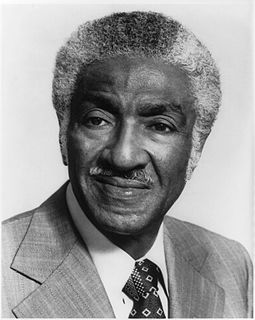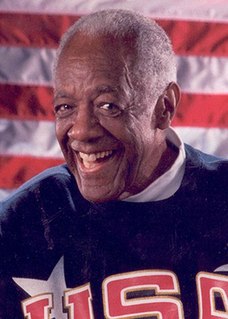
The 1936 Summer Olympics, officially known as the Games of the XI Olympiad and commonly known as Berlin 1936 or the Nazi Olympics, were an international multi-sport event held from 1 to 16 August 1936 in Berlin, Germany. Berlin won the bid to host the Games over Barcelona at the 29th IOC Session on 26 April 1931. The 1936 Games marked the second and most recent time the International Olympic Committee gathered to vote in a city that was bidding to host those Games. Later rule modifications forbade cities hosting the bid vote from being awarded the games.

James Cleveland "Jesse" Owens was an American track and field athlete who won four gold medals at the 1936 Olympic Games.

Archie Franklin Williams was an American U.S. Air Force officer, athlete, and teacher. He was the winner of the 400 meter run at the 1936 Summer Olympics. As recorded on his birth certificate, his name is Archie and not Archibald.

Ralph Harold Metcalfe Sr. was an American track and field sprinter and politician. He jointly held the world record in the 100-meter dash and placed second in that event in two Olympics, first to Eddie Tolan in 1932 at Los Angeles and then to Jesse Owens at the 1936 Olympics in Berlin, Germany. Metcalfe won four Olympic medals and was regarded as the world's fastest human in 1934 and 1935. He later went into politics in the city of Chicago and served in the United States Congress for four terms in the 1970s as a Democrat from Illinois.

Martin Irving Glickman was an American radio announcer who was famous for his broadcasts of the New York Knicks basketball games and the football games of the New York Giants and the New York Jets.
Cornelius Cooper "Corny" Johnson was an American athlete in the high jump. Born in Los Angeles in 1913, Johnson first competed in organized track and field events at Berendo Junior High School. He achieved greater athletic success as a student at Los Angeles High School, competing in the sprint and in the high jump. Before going to the Olympics as a junior, he won the CIF California State Meet in 1932. He had been second the year before. In 2016, the 1936 Olympic journey of the eighteen Black American athletes, including Johnson, was documented in the film Olympic Pride, American Prejudice.
David Donald Albritton was an American athlete, teacher, coach, and state legislator. He had a long athletic career that spanned three decades and numerous titles and was one of the first high jumpers to use the straddle technique. He was born in Danville, Alabama.
John Terry was an Olympic weightlifter for the United States.

The Jesse Owens Story is a 1984 American two-part, four-hour made-for-television biographical film about the black athlete Jesse Owens. Dorian Harewood plays the Olympic gold-winning athlete. The drama won a 1985 Primetime Emmy Award and was nominated for two more. It originally premiered in syndication on July 9 and 10, 1984 as part of Operation Prime Time's syndicated programming.

Gretel Lambert was a German Jewish track and field athlete who competed as a high jumper during the 1930s.

Matthew MacKenzie "Mack" Robinson was an American track and field athlete. He is best known for winning a silver medal in the 1936 Summer Olympics, where he broke the Olympic record in the 200 meters but still finished behind Jesse Owens. He was the older brother of Baseball Hall of Fame member Jackie Robinson.

Fritz Pollard Jr. was an American athlete who competed mainly in the 110 metre hurdles.
Sam Stoller was an American athlete who specialized in sprinting and long jumping. He tied the world record in the 60-yard dash in 1936. Stoller is best known for his exclusion from the American 4 × 100 relay team at the 1936 Summer Olympics in Berlin. The 2-man substitution triggered widespread speculation that he and Marty Glickman—the only two Jews on the U.S. track team—were excluded because U.S. Olympic Committee chairman Avery Brundage wanted to avoid embarrassing Adolf Hitler by having two Jewish athletes win gold medals. Stoller vowed at the time that he would never run again, but he returned in 1937 to win both the Big Ten Conference and NCAA championships in the 100-yard dash. After graduating from the University of Michigan in 1937, Stoller briefly went into a singing and acting career as "Singin' Sammy Stoller."

Berlin 36 is a 2009 German film telling the fate of Jewish track and field athlete Gretel Bergmann in the 1936 Summer Olympics. In the movie she was replaced by the Nazi regime with a fellow athlete which she befriended. The film, based on a true story, was released in Germany on September 10, 2009.
The men's 4 × 100 metres relay event at the 1936 Olympic Games took place on August 9. The United States team of Jesse Owens, Ralph Metcalfe, Foy Draper and Frank Wykoff won in a world record time of 39.8.

Race is a 2016 biographical sports drama film about African-American athlete Jesse Owens, who won a record-breaking four gold medals at the 1936 Berlin Olympic Games. Directed by Stephen Hopkins and written by Joe Shrapnel and Anna Waterhouse, the film stars Stephan James as Owens, and co-stars Jason Sudeikis, Jeremy Irons, William Hurt and Carice van Houten. It is a co-production of Canada, Germany and France.
The 1936 United States Olympic trials for track and field were held in July 1936 and decided the United States team for the 1936 Summer Olympics in Berlin. The trials for men and women were held separately; men's events were held at Randall's Island Stadium in New York City on July 11 and July 12, while women competed at Brown Stadium in Providence, Rhode Island on July 4. The top three athletes in each event qualified for the Olympic Games. The women's meeting also served as the annual outdoor track and field championships of the Amateur Athletic Union (AAU); the men's AAU championships were held separately a week before the Olympic trials.

Tidye Pickett was an American track and field athlete. She represented the United States in the 80-meter hurdles at the 1936 Summer Olympics in Berlin, becoming the first African-American woman to compete in the Olympic Games. In 2016, the 1936 Olympic journey of the eighteen Black American athletes, including interviews with Pickett's family, was documented in the film Olympic Pride, American Prejudice.
John William Brooks was an American long jumper. He competed in the 1936 Summer Olympics in Berlin, placing seventh in the long jump.

Louise Mae Stokes Fraser was an American track and field athlete.













